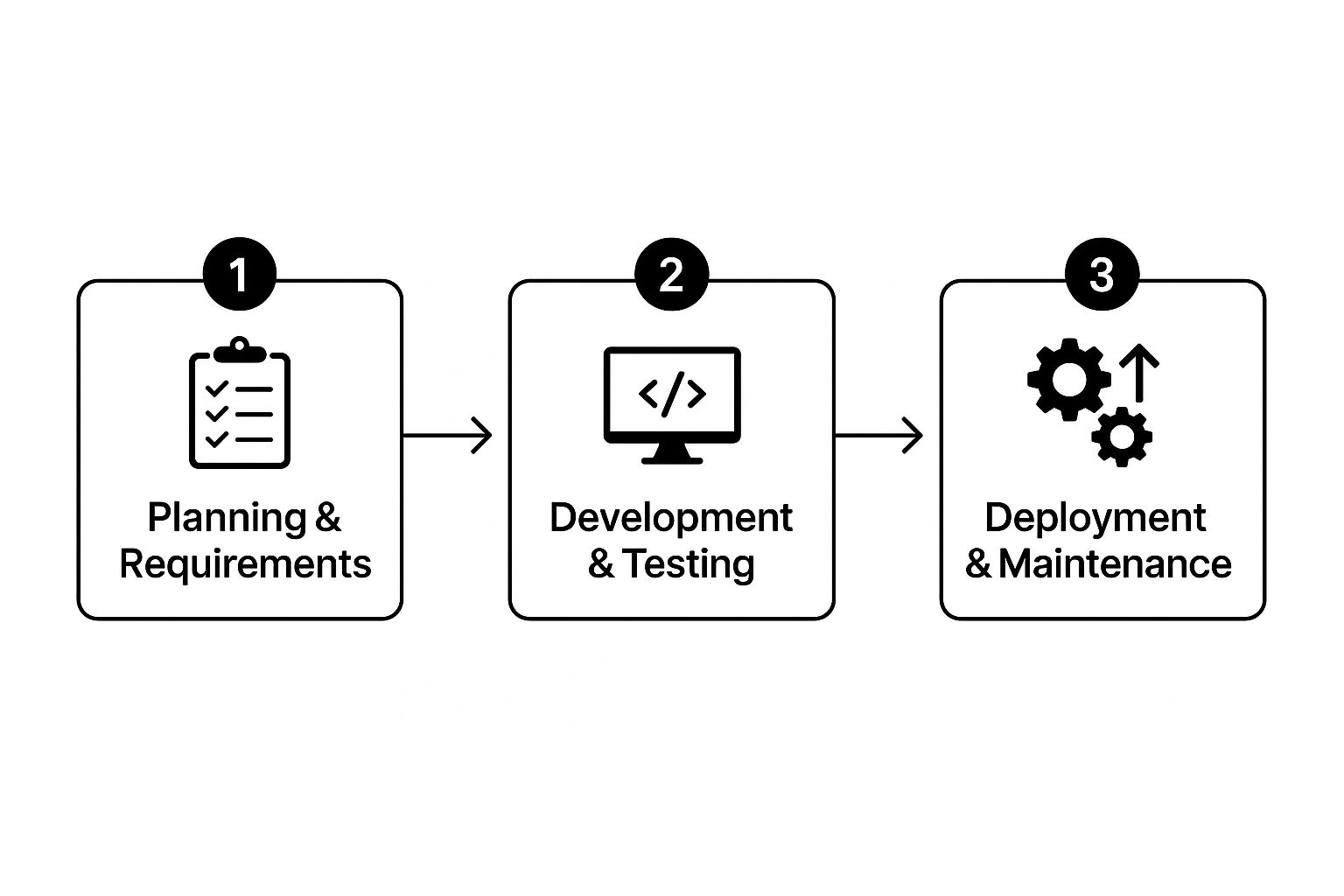When you hear “software development and consulting,” what comes to mind? For many, it’s simply a technical term for commissioning code. However, our extensive experience has shown us that this view misses the most critical component. The real value lies in forging a strategic partnership to build a digital asset that is deeply integrated with your long-term business goals—one that delivers a clear, measurable return on investment.
Demystifying Development and Consulting
To truly grasp the concept, let’s use an analogy. Imagine you want to build a custom home.
You wouldn't hire a builder, point to a plot of land, and simply ask them to start laying bricks. Your first, most crucial step would be to engage an expert architect. This professional would invest considerable time understanding your family’s lifestyle, your daily routines, and your vision for the future in that home.
The architect translates these requirements into a detailed, robust blueprint. They consider every element, from the structural integrity of the foundation to the logical flow between rooms, ensuring the final house isn't just well-built but is a perfect reflection of your needs. This is the consulting phase.
Only when that blueprint is perfected does the master builder begin their work. They apply their technical skill, select the right materials, and bring the craftsmanship needed to execute the architect's vision with precision. This is the development phase.
The Power of a Unified Approach
This principle holds true in the business world. The consultant is your business architect; the developer is your master builder.
A consultant's primary responsibility is to define the "why" and the "what" before a single line of code is written. A developer's responsibility is to then build it correctly. When these two roles work in concert, you get a powerful tool for growth, not just a piece of software.
This integrated approach elevates the process far beyond a simple technical task list. It’s about creating a genuine strategic advantage. Instead of just "building an app," this partnership ensures the app you receive is the right one to solve your most significant operational challenges, unlock new revenue streams, or forge deeper connections with your customers.
The synergy between these two functions is absolutely critical. Without insightful consulting, you risk building a technically flawless piece of software that addresses the wrong problem. Conversely, without expert development, a brilliant strategy can be undermined by bugs, poor performance, or an inability to scale. True business value is only unlocked when both disciplines are seamlessly integrated.
More Than Just Code
Ultimately, this strategic perspective ensures that every pound you invest in technology is directly linked to a tangible business outcome. It is a model built on delivering results, not just a list of features. Through our team's extensive experience, which you can read more about on our journey, we've seen time and again that this strategic alignment is the single most important factor in a project's success. It’s how businesses don’t just acquire new software; they gain a competitive edge that’s built to last.
The Core Benefits of Strategic Tech Partnerships

Engaging a software development and consulting partner is far more than an outsourcing decision; it is a strategic investment in your company's future. A true partnership unlocks tangible benefits that extend well beyond the software itself, directly boosting your bottom line and sharpening your competitive edge.
One of the most immediate benefits is gaining an objective, expert perspective on your operations. An experienced consultant brings fresh eyes, capable of identifying hidden inefficiencies and operational bottlenecks that internal teams might overlook due to their proximity to the processes. They can pinpoint precisely where bespoke software can automate repetitive tasks, liberating your team to concentrate on high-value, strategic work.
This strategic insight invariably leads to significant cost savings. By optimising workflows and automating manual processes, you not only reduce operational overheads but also mitigate the risk of costly human error.
Access Specialised Expertise Instantly
Attempting to build a comprehensive, senior-level software team in-house is a formidable challenge. It involves protracted recruitment cycles, substantial salary commitments, and continuous investment in training to maintain current skills. A strategic partnership provides instant access to a full suite of specialists without these associated overheads.
A partnership gives you the agility to bring in specific, high-demand skills exactly when you need them—whether it's cloud architecture, AI integration, or cybersecurity—and only for as long as you need them. This on-demand expertise is a powerful economic lever.
This model is particularly advantageous for medium-sized businesses aiming to compete with larger corporations. It allows you to leverage world-class talent to build robust, secure, and modern software without the financial burden of a large, permanent payroll. This approach aligns with the broader growth in the UK's tech sector. In fact, the UK's expanding software market size is projected to reach £45.8 billion in 2025, driven by digital transformation projects across British businesses.
Accelerate Your Time-to-Market
In today's competitive landscape, speed is a critical advantage. An established software development and consulting firm brings proven methodologies, refined processes, and experienced teams ready to execute from day one. This dramatically shortens the development lifecycle compared to building a team and processes from the ground up.
This velocity allows you to launch your product, service, or internal tool faster, seizing market opportunities before your competitors. This confers several key advantages:
- Faster Revenue Generation: Getting your software to market sooner means you start seeing a return on your investment much earlier.
- Quick User Feedback: An early launch is your ticket to gathering real-world user feedback. This allows for rapid improvements, ensuring the final product genuinely solves a market need.
- Seizing Market Windows: Many business opportunities are fleeting. A swift launch can be the difference between leading the market and just playing catch-up.
Ultimately, a partnership ensures your software is not just built quickly, but built correctly. The focus is on creating a solution that is scalable enough to grow with your business, secure enough to protect your data and reputation, and perfectly tailored to your unique way of working. This blend of speed and strategic precision is what turns a software project into a cornerstone of long-term success.
Our End-to-End Development and Consulting Process
A brilliant idea is just the starting point. Transforming that initial concept into a fully-realised, market-ready software platform that generates revenue is a significant undertaking. It requires a clear, collaborative, and structured journey. An effective software development and consulting process is not a rigid template; it's a flexible framework designed to maintain alignment, manage risk, and keep the project focused on your business objectives from inception to launch.
With over two decades of industry experience, we have honed our process to be both disciplined and highly adaptable. We believe our partners deserve complete transparency. That’s why we demystify every step, ensuring you understand not just what we're doing, but more importantly, why we're doing it. Think of it as a shared expedition map—we navigate the technical terrain together, making key decisions collaboratively at every stage.
This visual provides a high-level overview of our core methodology, breaking it down into the three fundamental stages that underpin every project we undertake.

While this overview illustrates the logical flow from strategy to launch, let's delve into the hands-on phases that constitute this end-to-end journey.
To give you a clearer picture of how we structure our engagements for success, here’s a breakdown of our five-phase approach. This table shows exactly what happens at each stage, ensuring we stay aligned with your business objectives every step of the way.
The Five Phases of Our Software Consulting and Development Journey
PhaseKey ActivitiesPrimary Outcome1. Discovery & StrategyStakeholder workshops, market analysis, competitor research, technical feasibility studies.A detailed Project Blueprint, including scope, feature list, and strategic roadmap.2. UI/UX DesignCreating user flows, wireframing, building high-fidelity mockups, and interactive prototyping.An approved, user-tested design that solves usability problems before coding begins.3. Agile DevelopmentBuilding software in two-week "sprints," with regular reviews and continuous integration.A functional, evolving piece of software delivered incrementally for feedback.4. Quality AssuranceContinuous manual and automated testing, bug tracking, and performance validation.A stable, secure, and bug-free application ready for deployment.5. Deployment & SupportManaging the go-live process, monitoring performance, and providing ongoing maintenance.A successfully launched platform with a plan for long-term growth and success.
Each phase builds upon the last, creating a solid foundation that minimises risk and maximises the likelihood of building a truly impactful solution.
Phase 1: Discovery and Strategy
This is, without question, the most critical part of any project. Before a single line of code is written, our consultants must get to the heart of your business. This is not a brief kick-off call; it is an immersive workshop where we define the core "why" behind your project. We work collaboratively to understand your business model, operational hurdles, target audience, and long-term objectives.
Key activities during this phase include:
- Stakeholder Workshops: We bring your key decision-makers together to forge a unified vision and define what success actually looks like for everyone involved.
- Market and Competitor Analysis: We scout the landscape to find gaps and opportunities, making sure your product is positioned to stand out from the crowd.
- Technical Feasibility Assessment: Our architects scrutinise the technical needs to recommend the most robust and scalable technology stack for your specific goals.
The primary deliverable from this phase is a comprehensive project blueprint. This document serves as our North Star for the entire engagement, detailing the project scope, a prioritised feature list, user personas, initial wireframes, and a clear strategic roadmap.
Phase 2: UI/UX Design
With a solid strategy established, our focus shifts to the user experience (UX) and user interface (UI). A powerful platform is destined to fail if it is difficult or frustrating to use. Our design philosophy is simple: put the user first. We create interfaces that are not only aesthetically pleasing but also intuitive, efficient, and enjoyable.
We begin by mapping detailed user flows and creating wireframes—the architectural blueprints for the software. This allows us to perfect the user journey and information architecture before focusing on visual design. Once this foundational structure is approved, we develop high-fidelity mockups and interactive prototypes that look and feel like the final product.
The goal of the UI/UX phase is to solve usability problems before development even starts. A well-designed prototype allows for early user testing and feedback, which is vastly more cost-effective than making changes to a fully coded application.
A cornerstone of our process is incorporating feedback loops. Understanding efficient customer feedback strategies is essential for validating our design assumptions and ensuring we are building a product that people genuinely want and need.
Phase 3: Agile Development and Quality Assurance
Once the design receives approval, our development team begins construction. We are staunch advocates of the Agile development methodology, building software in a series of short, iterative cycles known as "sprints." Each sprint, typically lasting two weeks, results in a tangible, working piece of the software that you can review and test.
This approach offers significant advantages:
- Total Transparency: You're in the loop at every step, with regular sprint reviews to see the progress firsthand and give your input.
- Built-in Flexibility: Agile makes it easy to pivot or re-prioritise features based on your feedback or a change in the market. No big deal.
- Early Risk Spotting: By building and testing in small chunks, we can catch and squash potential issues early on, long before they can grow into major headaches.
Working in tandem with development is our rigorous Quality Assurance (QA) process. Our QA engineers are integrated into the team from the project's inception, writing test cases and conducting a combination of manual and automated tests throughout every sprint to guarantee the software is stable, secure, and free of defects.
Phase 4: Deployment and Ongoing Support
The final phase is the culmination of our collaborative efforts: bringing your software to life. Our team manages the entire deployment process, ensuring a smooth, seamless transition to a live environment. However, our partnership does not end at launch. We provide ongoing support and maintenance to ensure your platform continues to operate flawlessly and evolves with your business. This includes performance monitoring, security updates, and planning future enhancements to secure your long-term success.
Key Technologies Shaping Modern Software Solutions

Understanding the process of software development and consulting is one part of the equation; knowing which technologies to leverage is another. We do not select tools based on trends; we choose them for their proven ability to create a tangible business advantage.
Currently, two forces are profoundly reshaping business software: Artificial Intelligence (AI) and the emergence of low-code/no-code platforms. When wielded correctly, they transition from technical buzzwords to powerful business accelerators, enabling companies to automate complex decisions, expedite time-to-market, and create superior user experiences. It's essential to look past the hype and understand their practical applications.
This is not a niche trend but a major industry shift. By 2025, over 70% of UK businesses are expected to invest in AI-driven development. Concurrently, approximately 60% are already utilising low-code platforms to accelerate their projects. This is all driven by a fundamental need for greater speed, efficiency, and security to maintain a competitive edge.
The Practical Power of Artificial Intelligence
While AI is often perceived as a complex, futuristic concept, its real-world applications are remarkably practical. It's best understood not as a replacement for your team, but as a tireless, hyper-efficient assistant capable of analysing vast datasets in seconds to identify patterns that a human team might take months to uncover.
For our clients, this translates into direct business gains. We can develop AI models that provide a logistics company with highly accurate demand forecasts or assist a financial services firm in detecting fraudulent transactions in real-time. This is not about simply adding a "smart" feature; it's about embedding intelligence directly into the core of your operations.
Expert Insight: The real magic of AI in business software isn't about replacing human judgment. It's about giving it a serious upgrade. AI handles the number-crunching and presents the probabilities, freeing up your team to make faster, better-informed strategic decisions with confidence.
Accelerating Delivery with Low-Code Platforms
While AI excels at managing complexity, low-code and no-code platforms are masters of speed and accessibility. These tools provide a visual approach to software construction, using drag-and-drop components and pre-built modules to assemble applications. This dramatically reduces the amount of manual coding required for certain types of projects.
This does not signify the end of traditional coding. Far from it. An experienced software development and consulting partner knows precisely when to employ a low-code solution and when a project demands the power and flexibility of custom code.
- Internal Tools: Low-code is ideal for rapidly developing internal dashboards, approval workflows, or data entry forms cost-effectively.
- Rapid Prototyping: It enables us to build and test a functional prototype with real users in a fraction of the typical time, validating an idea before committing resources to full-scale development.
- Empowering Staff: In some scenarios, non-technical staff can even manage or modify simple applications, freeing up specialist developers to focus on more complex, mission-critical systems.
Knowing when and how to leverage these platforms is a key competency in modern development. They are excellent for specific solutions, but for a truly unique competitive advantage, many businesses still require the depth offered by bespoke software development. To deploy these modern tools effectively, a strategic partner might also engage specialized DevOps consulting services to ensure development and operational workflows are fully optimised. Ultimately, our experience dictates the right tool for the job, ensuring the final product is robust, scalable, and perfectly aligned with your goals.
How to Evaluate and Choose the Right Partner
Selecting the right partner for your software project is one of the most significant decisions your business will make. It extends far beyond comparing portfolios or hourly rates. You are seeking a team that will become a true extension of your own, one that is as invested in your commercial success as you are.
The right software development and consulting firm acts as a strategic ally. They will guide you through complex technical decisions while maintaining an unwavering focus on your core business objectives. An incorrect choice, however, can lead to squandered budgets, missed deadlines, and a product that fails to meet expectations.
To make an informed choice, you must look beyond slick marketing. It requires a rigorous assessment of a potential partner’s real-world expertise, their processes, and, critically, their cultural fit with your organisation. This is a two-way street; finding a team that communicates transparently and shares your vision is paramount.
Look Beyond the Portfolio
A polished portfolio is impressive, but it only shows you what a firm has built. It fails to reveal how they built it, what challenges were overcome, and the lessons learned. This is where deeper investigation is necessary.
Request that potential partners walk you through a case study relevant to your project. Do not hesitate to ask detailed questions. Inquire about the unexpected challenges they encountered and, more importantly, how they resolved them. An experienced team will be transparent about the hurdles. They won't just showcase the final product; they’ll explain the complex, problem-solving journey required to achieve it. This is a far better indicator of their competence.
Furthermore, do not be reluctant to ask for client references. A confident firm will gladly connect you with past clients. During these conversations, inquire about their communication practices, adherence to budgets, and how they managed unforeseen issues.
Assess Their Technical and Strategic Expertise
An exceptional partner does not merely write clean code; they possess deep business acumen. While their technical capabilities must align with your project's needs, they also need to comprehend your market and commercial ambitions.
A partner’s value isn't just in their ability to code; it's in their ability to ask the right questions. They should challenge your assumptions and offer strategic advice that adds genuine value, ensuring the final software isn't just functional but a powerful business asset.
A good method for gauging this is to ask how they would approach your project. A truly experienced firm won’t simply agree with everything you propose. They will contribute their own insights, perhaps suggesting an alternative approach or a feature you hadn't considered that could deliver a superior return on investment. This proactive, strategic thinking is the hallmark of a top-tier software development and consulting partner. A key part of this is understanding their approach to strategic consulting services, which is a critical area to explore.
Key Questions for Your Shortlist
To structure your evaluation, here is a checklist of questions to ask every firm you are seriously considering. Their responses will reveal much about their experience, process maturity, and suitability as a long-term partner.
- Industry Experience: "Can you show me examples of projects you've done in our sector? What were the specific problems you helped those clients solve?"
- Project Management: "What’s your project management style, and how will you keep us in the loop on progress? How do you handle scope changes and budget adjustments?"
- Technical Approach: "What technologies would you recommend for this project, and why are they the best choice for our long-term goals? How do you make sure the product is secure and can scale with us?"
- Communication & Culture: "Who will be our day-to-day contact? What does your communication and collaboration process actually look like?"
- Long-Term Partnership: "What happens after launch? What do support and maintenance look like, and how do you help clients plan for future growth?"
The strength and clarity of their answers will be your best guide. This is especially vital in a booming market. The UK's software development sector is projected to hit USD 70.99 billion by 2030, fuelled by a deep talent pool and government investment in digital transformation. This growth has also led to a rise in software development outsourcing as a strategic move for businesses needing to scale their capabilities. Choosing a partner with a proven track record in this dynamic environment is essential for success.
Your Next Steps Towards Digital Transformation

This guide has explored the multifaceted world of software development and consulting. It should now be clear that this is much more than a technology project; it is a strategic initiative that can fundamentally shape your company's future.
Executed correctly, a software project delivers far more than lines of code. It creates tangible, lasting value by streamlining operations, strengthening customer relationships, and unlocking new revenue streams.
This journey is about changing how you see technology. Stop thinking of it as a cost and start seeing it as the engine that drives your business forward—a strategic asset that will pay you back for years to come.
Embracing this shift in perspective is the first and most critical step. Now, let’s discuss how to put this understanding into action.
Turning Challenges Into Opportunities
Take a moment to reflect on your own business. What are the persistent bottlenecks that impede progress? Are there untapped opportunities to better serve your customers or enter new markets?
The answers to these questions are the starting point for your digital transformation.
A true technology partner does not simply build what you specify. They work with you to identify the right problems to solve. They bring years of experience to the table, helping you envision how a bespoke software solution can transform your greatest challenges into your most significant competitive advantages.
Pinpointing these specific challenges within your business is the perfect launchpad. The next step is to discuss these ideas with experts who can bridge the gap between your vision and a robust, market-ready solution.
Ready to see what's possible? We invite you to book a no-obligation consultation with our team. Let’s talk about your ideas and map out a clear path to achieving your goals through technology.
We also offer the following consulting services:
Frequently Asked Questions
How Much Does Custom Software Development Cost?
This is often the first question asked, and the honest answer is that there is no single figure. Requesting the cost of custom software is analogous to asking for the price of a car—it depends entirely on the specifications. A simple internal utility is one thing; a complex, public-facing platform with AI features and multiple third-party integrations is another matter entirely.
The cost is driven by several key factors:
- Project Complexity: The number and intricacy of the features required.
- Technology Stack: The specific technologies used for the front-end, back-end, and databases.
- Team Size: The number of developers, designers, and project managers required for successful execution.
- Third-Party Integrations: Connecting the new software to existing systems adds complexity.
Due to these variables, any firm that provides a price without a thorough discovery process is merely guessing. The only reliable way to determine a budget is through a formal discovery and strategy session where we meticulously map out your requirements. This initial investment in planning invariably saves significant costs later by preventing scope creep and unforeseen expenses.
How Long Does a Typical Project Take?
Similar to cost, the project timeline can vary dramatically depending on its scope. We have delivered straightforward applications and Minimum Viable Products (MVPs) in as little as 3-6 months. Conversely, a sophisticated, feature-rich platform can easily require a year or more to design, build, and launch properly.
The most significant factor influencing the timeline is the clarity of the initial requirements. A project with a well-defined strategy and a clear feature set will always progress more rapidly than one with ambiguous requirements. We employ an agile methodology, working in two-week sprints, which ensures you see consistent progress and a functional version of your software at regular intervals. However, the total duration is ultimately determined by the volume of work required.
What Is the Difference Between a Freelancer and a Consulting Firm?
This is a critical distinction. While both a freelancer and a consulting firm can write code, the services they provide are fundamentally different.
A freelance developer is a skilled technician you hire to complete a specific, well-defined task. A software development and consulting firm is a strategic partner you engage to solve a broader business problem from end to end.
Consider this analogy: you hire a freelancer to build a single feature that you have already designed. You engage a firm to help you determine what to build, design it with a user-centric approach, construct it, test it, launch it, and provide long-term support. A firm brings a multidisciplinary team—strategists, designers, project managers, and multiple developers—offering a complete, reliable partnership that extends far beyond coding.
At Make IT Simple, we've dedicated over 20 years to turning complex business challenges into successful, market-ready SaaS platforms. If you're ready to see how a strategic technology partner can help you hit your goals, let's have a chat.
Book Your Consultation with Make IT Simple


.jpg)

.jpg)
